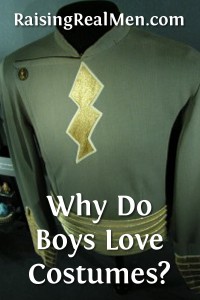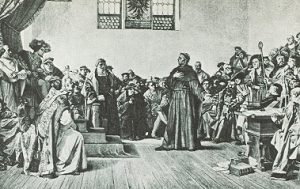Somebody’s Behind the Mask
 Oddly enough, we were on the way to church when the subject of Halloween costumes came up. Our approach to the event has been contrarian from the start—everything from handing out really good candy with tracts, through simply turning off the porch light to the wonderful solution we finally came to (we’ll tell you about that tomorrow). Our kids have a vibrant (sometimes feverish) imagination all year long, so dressing up and playing a role are nothing unusual in our household. We unbend a bit on the issue of candy—Dad likes it too, you know—though I’ll confess sometimes our kids find marshmallow pumpkins and caramel corn in their Christmas treats.
Oddly enough, we were on the way to church when the subject of Halloween costumes came up. Our approach to the event has been contrarian from the start—everything from handing out really good candy with tracts, through simply turning off the porch light to the wonderful solution we finally came to (we’ll tell you about that tomorrow). Our kids have a vibrant (sometimes feverish) imagination all year long, so dressing up and playing a role are nothing unusual in our household. We unbend a bit on the issue of candy—Dad likes it too, you know—though I’ll confess sometimes our kids find marshmallow pumpkins and caramel corn in their Christmas treats.
But there is a practical question, quite apart from the trick-or-treat and bags-of-candy aspect. If you leave aside the more grown-up temptation to don a mask and do anonymous mischief, what prompts our kids and particularly our boys to choose certain types of costumes and identities to put on?
“I think I know,” I said, moving into the turn lane. “I wondered the same thing about grown men wearing a hat with a superhero logo on it, and it’s the same as wearing an NFL jersey. Boys, and men, want respect. They want to be associated with the concept of strength, power, and capability, and if they can’t get respect, they’ll settle for being feared.
“I think the spooky costumes are a way of saying, ‘I’m not afraid of ghosts, but you should be afraid of me—Boo!”
Working along that line of thought, I realized it has some interesting implications in how we parent our boys.
For one thing, how should we respond to that craving for respect in a boy? First, it’s our sons’ duty to learn obedience toward God-ordained authority. Jesus was the Son of God, but as a young man He submitted Himself to being governed by human parents: “And he went down with them and came to Nazareth and was submissive to them … and Jesus increased in wisdom and stature and in favor with God and man,” the Gospel of Luke says of the twelve-year-old Jesus (2:51-52). Our sons do need to recognize that they have a place, and it’s not one of equality with their parents.
But even while we do that, we the parents can recognize his desire to be respected, even at a young age. Some people laugh about the “fragile male ego,” but it’s not really a laughing matter. A great deal of a man’s self-identity is wrapped up in his reputation. A good name is to be chosen rather than great riches (Proverbs 22:1).
As a practical matter, we try to be careful how we speak to our sons, especially in front of others—even family members. They need correction and even discipline from time to time—if you are left without discipline, then you are illegitimate children and not sons (Hebrews 12:8)—but as much as possible, we try to administer the correction in private. And when we need to just give them verbal direction, we try not to belittle them. Someone said that a small dog is just as big inside as a big one; I think it applies to boys in some ways, too.
That desire to be associated with strong examples is not a bad thing. Paul tells believers to “put on the Lord Jesus Christ” (Romans 13:14) and to “Be imitators of me, as I am of Christ” (1 Corinthians 11:1 and several other places). So we try to get our boys really good examples to follow. The world and its media recognizes brute strength and the force of will; do your sons have examples of manly gentleness, humility, duty, and moral as well as physical courage?
 This time of year, coincidentally, is the birthday of the Reformation. We always take time to talk about Martin Luther and his willingness to lay down his life for the sake of truth. “My conscience is captive to the Word of God,” he told the Emperor, “and to go against conscience is neither right nor safe … I cannot and I will not recant. Here I stand; I can do no other; God help me.” There’s a great B&W movie about him that we’ve probably watched twenty times. (You can also get it streaming on Netflix.)
This time of year, coincidentally, is the birthday of the Reformation. We always take time to talk about Martin Luther and his willingness to lay down his life for the sake of truth. “My conscience is captive to the Word of God,” he told the Emperor, “and to go against conscience is neither right nor safe … I cannot and I will not recant. Here I stand; I can do no other; God help me.” There’s a great B&W movie about him that we’ve probably watched twenty times. (You can also get it streaming on Netflix.)
Another example, not so famous, is the American historian Francis Parkman. He had to overcome incredible, painful illness and disability, to carry out his scholarly work documenting the history of the early American West. Theodore Roosevelt, a man of great character himself, dedicated one of his books to Parkman, and tells his story in Hero Tales from American History, a change from the stories of explorers and soldiers. Roosevelt also talked about John Quincy Adams’ long fight against slavery, serving as a Congressmen after he finished his term as president. (You can hear both of these stories on part 3 of our Hero Tales audiobook – see below!)
So as you see the little goblins in the streets this week, take a minute and think about the children underneath the masks. What are they thinking (besides “Who’s got the best candy,” I mean)? Are they looking for someone to follow? Or making a statement about what they’d like to be? Those can be some very interesting openings for you to follow up as a parent.
ARE YOU LOOKING FOR HEROES? THESE RESOURCES CAN HELP!
Where Is Roy Rogers When You Need Him? is our workshop about our boys’ need for heroes and role models, and ideas about where to find them. $5 on CD, or $4 for mp3 download.
NEW! Hero Tales from American History – Part 3
The next volume of our popular audiobook series from the book by Theodore Roosevelt and Henry Cabot Lodge. Hear the dramatized stories of the backwoods general who beat the British army – a former president’s fight against slavery – the suffering scholar of the American West – and the opening battles of the War Between The States! Introductory price only $5 (Regular price $7) To be released in November!
Or you can order the whole set – from the birth of George Washington to the War Between the States – for just $20 (Save $8 and get free shipping, too!)
Read Part One here and Part Three here of our thoughts on the season.
